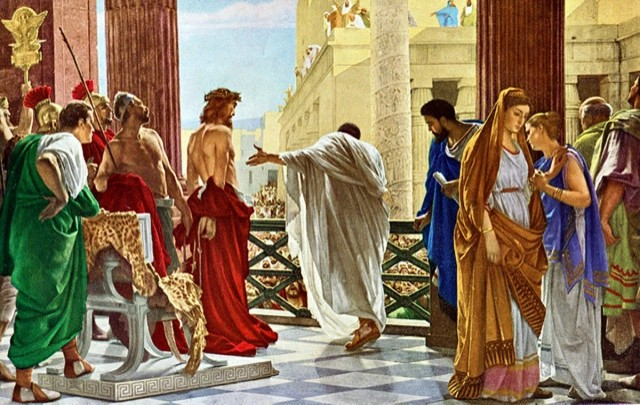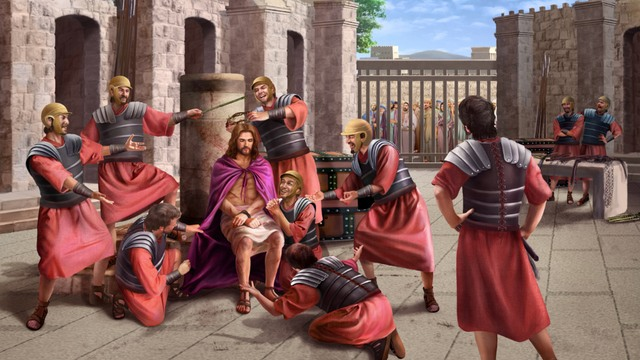𝗟𝘂𝗸𝗲 𝟭𝟬:𝟭𝟯-𝟭𝟱 “𝗪𝗼𝗲 𝘁𝗼 𝘆𝗼𝘂, 𝗖𝗵𝗼𝗿𝗮𝘇𝗶𝗻! 𝗪𝗼𝗲 𝘁𝗼 𝘆𝗼𝘂, 𝗕𝗲𝘁𝗵𝘀𝗮𝗶𝗱𝗮! 𝗙𝗼𝗿 𝗶𝗳 𝘁𝗵𝗲 𝗺𝗶𝗴𝗵𝘁𝘆 𝘄𝗼𝗿𝗸𝘀 𝗱𝗼𝗻𝗲 𝗶𝗻 𝘆𝗼𝘂 𝗵𝗮𝗱 𝗯𝗲𝗲𝗻 𝗱𝗼𝗻𝗲 𝗶𝗻 𝗧𝘆𝗿𝗲 𝗮𝗻𝗱 𝗦𝗶𝗱𝗼𝗻, 𝘁𝗵𝗲𝘆 𝘄𝗼𝘂𝗹𝗱 𝗵𝗮𝘃𝗲 𝗿𝗲𝗽𝗲𝗻𝘁𝗲𝗱 𝗹𝗼𝗻𝗴 𝗮𝗴𝗼, 𝘀𝗶𝘁𝘁𝗶𝗻𝗴 𝗶𝗻 𝘀𝗮𝗰𝗸𝗰𝗹𝗼𝘁𝗵 𝗮𝗻𝗱 𝗮𝘀𝗵𝗲𝘀. 𝗕𝘂𝘁 𝗶𝘁 𝘄𝗶𝗹𝗹 𝗯𝗲 𝗺𝗼𝗿𝗲 𝗯𝗲𝗮𝗿𝗮𝗯𝗹𝗲 𝗶𝗻 𝘁𝗵𝗲 𝗷𝘂𝗱𝗴𝗺𝗲𝗻𝘁 𝗳𝗼𝗿 𝗧𝘆𝗿𝗲 𝗮𝗻𝗱 𝗦𝗶𝗱𝗼𝗻 𝘁𝗵𝗮𝗻 𝗳𝗼𝗿 𝘆𝗼𝘂. 𝗔𝗻𝗱 𝘆𝗼𝘂, 𝗖𝗮𝗽𝗲𝗿𝗻𝗮𝘂𝗺, 𝘄𝗶𝗹𝗹 𝘆𝗼𝘂 𝗯𝗲 𝗲𝘅𝗮𝗹𝘁𝗲𝗱 𝘁𝗼 𝗵𝗲𝗮𝘃𝗲𝗻? 𝗬𝗼𝘂 𝘀𝗵𝗮𝗹𝗹 𝗯𝗲 𝗯𝗿𝗼𝘂𝗴𝗵𝘁 𝗱𝗼𝘄𝗻 𝘁𝗼 𝗛𝗮𝗱𝗲𝘀.
The stark proclamations of eternal judgment are unsettling. People are condemned by their place of residence?
Jesus was telling his disciples what to do if they and their message were not accepted where they went – that they were to shake the dust off their feet to rid themselves of the dust of that place. Since the message of Messiah was not accepted in that town, so that place was not accepted by Messiah. And far more than a visit by a disciple was a set of miracles done in the midst of a place by God the Son.
It is implicit that societies tend to act tribally – as one person. This can work both ways – to accept and embrace or to reject and cast out. After Jesus did what he did in Chorazin, Bethsaida and Capernaum, he was rejected as Messiah. They had failed to repent of their sins; a clear indication of that rejection.

For an authentic, life-changing heart turning towards God is the expected, even required response to the miraculous. That stands in contrast to an entitled, thankless response. People who seek only to profit themselves – financially, healthfully or in some caste system sense – negate the purpose of the work done in and for them.
Since the people in entire cities or locales tend to act a one, they bring down the whole place with their attitudes and responses. Does this mean every person living within city limits stands condemned. No, that is certainly an overstatement. It does mean that people in those places need to turn from the decrepit status quo – meaning that they may have to exert themselves more in order to turn to God. In a godless society, a Christ follower is a rank rebel.
Jesus came that we might have abundant life – and that life is predicated upon following him. The very first thing a would-be disciple notices is a need to change – there are paths of thought, speech and action that need to be reformed. And some will not allow that to happen.
Search my heart O Lord.








